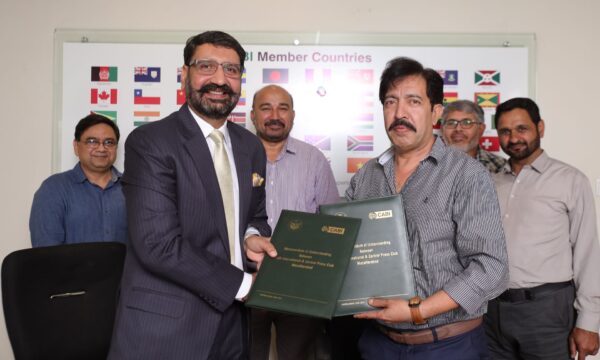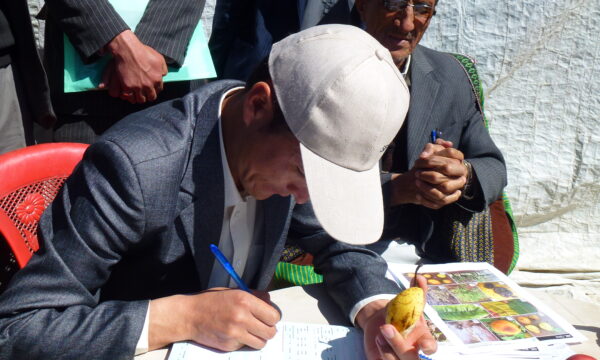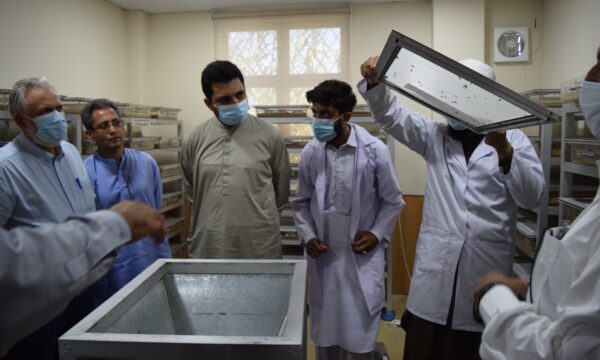
Giving children the opportunity to learn more about insects at a young age may create the interest and enthusiasm required for a subsequent career in entomology. Photo taken at Penn State’s Great Insect Fair, 2012 hosted by Penn State’s College of Agricultural Sciences’ Entomology Department © Penn State (CC-BY-NC 2.0)
Increasing the production of food in an environmentally sustainable way is a major global issue. A report produced by the UK Cabinet Office in 2008 predicted that the global population will rise to 9 billion by 2050 from a current 6.8 billion. This increase in population will substantially increase demand for food, with food production needing to increase by 70% in the next 40 years whilst using the same agricultural footprint and without depleting natural resources. This challenge will require collaboration between universities, research institutes and industry in order to make the considerable advances in technology required to feed a growing population. There is now increasing concern that there are too few specialist graduates in the UK with the expert knowledge and skills required to tackle the issues surrounding global food security.
Estimates suggest that UK agriculture needs 60,000 more workers for optimal productivity, including graduates with advanced problem-solving skills and expert knowledge. There are currently 7,000 agriculture students graduating from UK universities and colleges every year, which is insufficient to replace the 10,000 or so leaving the industry through retirement. The agricultural industry must work with universities and research institutes to design courses that will produce graduates with the necessary skill and expertise required.
Unfortunately many UK universities have stopped or greatly reduced their teaching and research into agriculture and crop sciences. There is a shortage of expertise in such subjects, in particular in specialist areas such as plant pathology, entomology, nematology and soil science. There is a real danger that valuable skills and expertise will be lost as researchers and teachers retire, which is particularly concerning given the urgent need to increase food production to feed a growing population. Up until recently, Imperial College London ran several specialist Master’s degrees at their Silwood Park campus in subjects including Conservation and Forest Protection, Ecological Applications, Entomology and Integrated Pest and Disease Management. Now, Harper Adams University in Shropshire is the UK’s only provider of post graduate courses in subjects including Entomology, Plant Nematology and Plant Pathology.
Despite the huge importance of pest management in agriculture, no undergraduate degrees in entomology currently exist in the UK, with the last undergraduate course in entomology in the UK ending in 1993. Graduates from courses such as the ones available at Harper Adams University can go on to find employment in commercial biological control companies, agro-chemical companies, the horticulture sector, or research institutes including Forest Research, FERA or Rothamsted Research. A large proportion of graduates from these subjects also go on to do further academic research and PhD’s.
The lack of young people studying these subjects can be explained by the lack of available courses and degrees, but also in part due to the lack of public awareness of the importance of pest management. Integrated pest management (IPM) is the careful selection and use of pest control measures to discourage the development of pest population and keep pesticides and other interventions to levels that are economically justified and minimise risks to human health and the environment. This requires a high level of knowledge and expertise of the biology and ecology of the pest species, their habitat and behaviour and understanding of the available management methods which may include techniques such as selective use of pesticides, biological control agents, biopesticides, resistant plant varieties and cultural control methods such as crop rotation. The majority of pest managers work in forestry, horticulture and agriculture, in which is is estimated that 25% of crops are lost to pests and diseases, such as insects, fungi and plant pathogens (FAO Crop Prospects and Food Situation 2009).
In conclusion, it is evident that in the UK there is an urgent need for a new generation of agricultural specialists with the skills and expertise required to ensure increased food security and work towards increased food production in an environmentally sustainable way.
References:
“Pest Managers Are Ecologists Too”, (2013), Don’t Forget the Roundabouts, Simon Leather
“Food Matters: Towards A Strategy for the 21st Century” (2008), The Strategy Unit, Cabinet Office.
Related News & Blogs
Using biocontrol-based integrated pest management to reduce pollinator loss
Pollinators, such as bees, bumblebees, butterflies, and some flies, play a crucial role in agricultural ecosystems by facilitating the reproduction of about 80% of our crops. Pollinators assure at least 30% of human’s food production. However, their po…
9 April 2025




